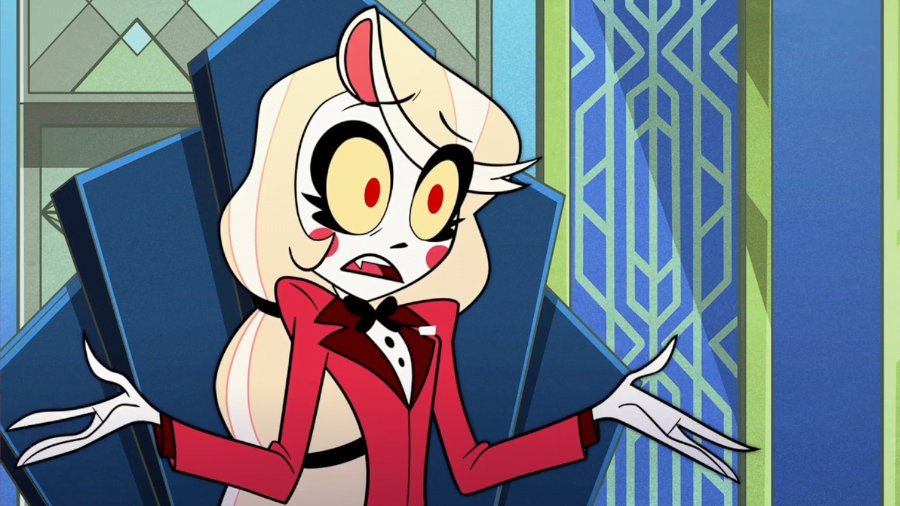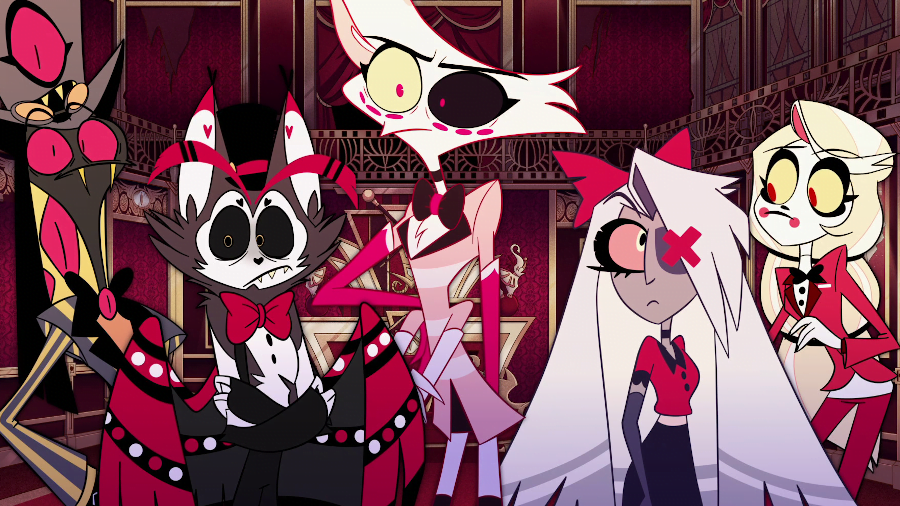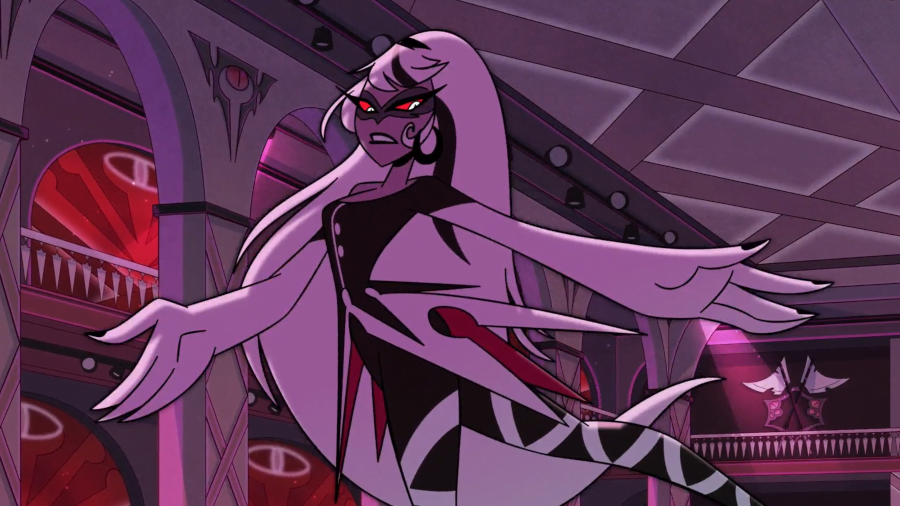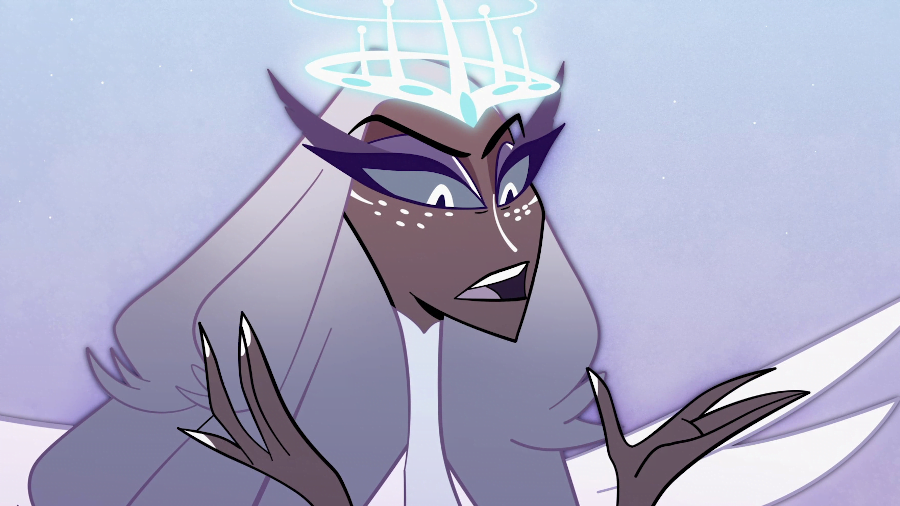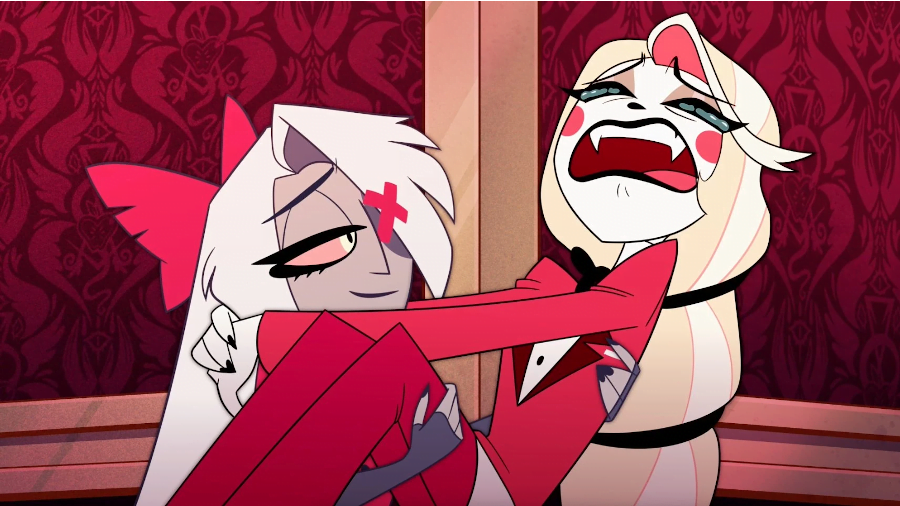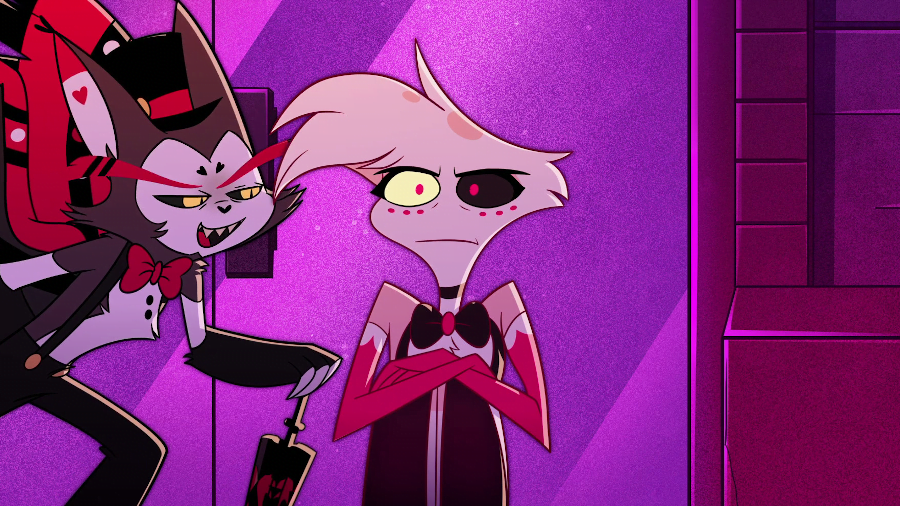sigh
so I like this a lot I guess.
It wasn’t like I approached Hazbin Hotel expecting to find a thing I loved. It was something a friend was interested in and I watched it with them because I love them to pieces and it seemed interesting enough. I wasn’t expecting to really enjoy myself so much – in fact my predominant thoughts about Hazbin Hotel prior to that was that it was media made for someone younger than me with a reference pool shallower than mine, an Edgy Cartoon made by someone who bootstrapped their way into heading up an animation studio. Quite frankly, the story to me of how Hazbin Hotel happened was so much more interesting than anything Hazbin Hotel was offering me!
Here’s your line though! This is your Spoiler Warning for a series that’s got hidden information in it (though doesn’t every story), and your Content Warning for a series that’s pretty heavy on cartoon sex references, drug references, and over-the-top violence. It’s pretty funny in terms of what kind of show it is in that okay, aside from more f-bombs than you’d assume and more c-bombs than I’d ever expect, but other than that I don’t feel like it does a lot with its higher rating. Still:
- Parental neglect
- Drug addiction
- Alcohol addiction
- Gambling addiction
- Sex work
- A friendly local neighbourhood serial killer
Hazbin Hotel is a very stealable animated series from Amazon’s animation studio that started its life as a series of speedpaints of weirdo OCs from an artist who then bootstrapped that fanbase into a patreon then that patreon into a kickstarter then that kickstarter into a pilot then that pilot into a pair of series that seems to have legs enough for two or three seasons. One of them, Helluva Boss, I’ll probably talk about at some point in the future because…
I mean, I probably will, but we’re talking about Hazbin Hotel here because Hazbin Hotel is something that got under my skin real fast.
I debated not talking about it in April, in Talen Month, because I after all, have two anime on the roster. I absolutely think that there’s room to call Hazbin Hotel an anime, based on its common visual language and rules it uses for how it presents expressive character language. After all, at the very least, it’s being made by at least one non-white person who probably isn’t being paid as much as she deserves.
Jokes aside, though, Hazbin Hotel is a musical Christian horror animated series set in an American Hell and follows the narrative of Charlee Morningstar, the daughter of Lucifer as she starts up a project for the redemption of damned souls in Hell. The plan is to take people into her Hotel, show them a way to change their life through emotional support, therapy, and trust, and then, stage two question mark question mark question mark, stage three, they go to heaven, redeemed. It follows Charlee as she grapples with the feasibility of her plan — ie, is it possible for a soul in Hell to change — and then the other feasibility of her plan — ie, will Heaven let a soul leave Hell?
And there are songs!
This is a character-driven series. You have to care about the characters to follow them, and I think that all the characters presented have distinct motivations, worldviews, and voices. That last part is a big part of getting into Hazbin Hotel for me because it looks as a series like it was made to suit a particular aesthetic, unified with a colour palette and – I mean, characters almost universally have the same mouth. People – not just the ones in hell – have the big jaggy teeth, and when a bunch of characters share a trait like that it can create a flattening feeling.
I find the characters really different – in fact, somewhat to their detriment, see later! The Hotel has a bunch of characters who are present for their own reasons. It’s fun, too, because narratively, there’s an excuse for why the characters are where they are: It’s a hotel for losers trying to escape Hell, you could have had almost all the cast come for that same central reason and differentiate them for other reasons. In Hazbin Hotel, the cast don’t have that as their motivation – there’s nobody in the cast for as straightforward a reason as ‘I want to do what this Hotel is supposed to do.’
Charlee is there because she believes in the mission, as a way to help people in Hell. Vaggie is there because she believes in her girlfriend. Angel Dust is there to mooch; he sees it as convenient. Husk is there because he’s ordered to. Nifty is there because she’s been given it as a responsibility. Sir Pentious is there because of a scam. Each of these choices gets transformed through the alchemy of the series into being sincere believers in the mission of the Hotel, and Alastor-
Oh yes.
Alastor.
Phew.
Alastor is a special case. There’s a lot going on with him that I like, from his Old Timey radio voice affect (complete with distortion effect on the track!), to his Arch Serial Killer With Rules vibes, his ‘effortless’ coolness that only works because of how much effort he puts into it, his deeply pagan iconography, his ambitious boiling seething at his limitations, and of course, most importantly of all, how much of a petty shit he is.
Alastor is probably my favourite character if you ignore various image searches for Angel Dust. I like Alastor so much that I’m reasonably confident I’m going to be peeling off things that reference him from his character and imbuing them into other OCs for a few years, like someone making every part of an orange work for a bunch of different meals and even planting the seeds. Alastor is made up of so many, coherently held together things that are my jam that I understand the kind of people who look at a character in media and say ‘it me’ unironically.
And he’s wrong.
One of the things Alastor does in the story, to me, is present the role of the Powerhouse. The Powerhouse isn’t the most important character, they’re not the one going through the most character development. They’re not the one who the story needs to turn to for important emotional responses or themes, because he’s the one who’s there to show up when the story needs power that can be brought to bear on saving or mopping up something someone else did. I love powerhouses, they’re one of my favourite archetypes; let other people take the centre stage, let their choices be the ones that matter, and I will cheer for the one who shows up to save and protect those choices. I have so much fun with Powerhouses, whether they’re the disappointed fixer or the beloved first follower. Alastor is Charlee’s Powerhouse. He’s convinced that when the time comes to fight Adam, he’s going to be able to step up to and meet that and beat it, because he can.
And he’s wrong.
It would be one thing if Alastor could do it! That’d be cool too! It wouldn’t be a bad thing to do. But it’s another thing if all of Alastor’s posing and pushing for power with characters like Lucifer and Adam was based on a very reasonable assumption about his power and the power of his opponents. Because it’s possible to have reasonable assumptions and just not have those assumptions be correct. Alastor carries himself like he’s the scariest man in the world, and he really is for most people who deal with him. It’d be enough for him to merely be amazing.
And he’s wrong.
It’s that wrongness that brings with it the little dash of complexity Hazbin Hotel needed to really excite me. Compexity is how it takes a story set up to make perfectly good, standard interfaces between ideas like ‘what is good and evil’ and ‘how can you live in hell without getting used to hell’ and then take just the slightly less-than-obvious next step in the answers. It involves looking at characters in this fantastic situation and considering them not as inhuman entities shriven of identity, but rather monstrous versions of human entities, with human needs and wants and ideals, and for there to be ways those wants and needs become amplified through the shedding of an idea of hope.
I like how it’s a musical, in that context! It’s full of characters who do something weird and inhuman (sing their feelings in contextually warped fantasy spaces), and then uses that to present very real, very deep truths about who they are, even including things they wouldn’t – or shouldn’t! – say without the song propelling them along.
The songs aren’t all electro-swing numbers, though enough are that I felt pleasantly served. I like electro swing! I like powerful Disney numbers! I like diegetic non-diegetic music! I also like the ways they use the songs for jokes! Multiple songs are interrupted and the interruptions are part of the story! And the complexity of the characters plays out in the songs! Like how Alastor invades a song to be petty, or the moment when Angel Dust realises he’s not going to be ridiculed for joining in a song.
Something I like about song in this genre is when they can stand on their own – when they begin or end cleanly and aren’t interrupted by dialogue from the narrative per se. Like, when the song’s job is part of the story, and the story is not needing to fight the song for its place. The biggest sin of the songs in Hazbin Hotel to me is that a few of them could afford to be longer and more varied – which is to say, hey, I like this, and would like more of it.
I describe it as a Christian Horror series depicting an American Hell. It’s a Heaven and Hell situation in the image of current modern mainstream American Christianity, which is to say, it doesn’t make much sense as presented. Hell in the Bible is not represented as a place with cities and culture, it’s barely presented at all – you get more of a ‘outer darkness’ or ‘neverending burning’ kind of vibe than ‘a city where people can keep doing things that are inappropriate.’
Look also to who gets damned to Hell and why. The complaint about Angel is that he’s a crack whore who burned his original chance. We don’t know what Angel’s life before Hell was like, but his life in Hell appears to be largely pretty harmless; he does drugs, he makes porn. That is to say, he does two things that only negatively affect himself. This doesn’t make sense as an inherent sin or anything but that’s okay because this world doesn’t seem to be one that has any idea about what makes anyone deserve anything; people in hell are present because they are present in hell, and that’s used to tautologically justify their presence there. But people in Hell can love and form bonds and elevate one another and be kind and even have kids –
Unless the kids in hell are there because they died as sinful children, which is okay, that could be what’s happening too.
There’s this book, Only Begotten Daughter, by Jame Murrow. In that book, god has a daughter, with a dude, working at a sperm bank, and she goes on an adventure through various elements of divine life that the Bible presents but doesn’t properly explore. In that book she winds up going to heaven – briefly – and finds to her surprise there are like, four people there; Moses, Jesus, Enoch and Elisha. When she quizzes them about this the response is ‘well, yeah, almost nobody gets into Heaven, it’s just not possible, with all the rules that conflict with one another.’
It’s that kind of heaven that Hazbin Hotel is built around, and it comes with it to show an idea of divine hiddenness. The problem of divine hiddenness is of the seeming contradiction in the idea of a God that exists, is omnipotent and omnisicent, and wants people to believe in him but there are people who sincerely want to and aren’t convinced by what has been presented to them as evidence. How does that work? In Hazbin Hotel, god, as much as they may or may not exist, appears to be abscent. People don’t even talk about them – they refer to powers around them, but no individual who can sort things out.
This god is missing, somehow, in a way that nobody talks about.
All this appeal isn’t to try and imply that Hazbin Hotel is immune to criticism. To laundry list it all that I have problems with is kinda unnecessary, but just off the top of my head, there’s a certain way the story allocates indulgences to specific characters. Any and all sex jokes are going to go through Angel Dust, which means they are going to come across as gay, rather than necessarily bi or pan. The result that seems to come from that is that Vaggie and Charlee despite being girlfriends from day 1 and sleeping in the same bed, seem kinda sexless, because all the Sex Stuff happens through Angel Dust.
In the same vein, this vision of Hell talks about ‘bad things’ but keeps those bad things in a very specific vein, like murder and being a participant in some things. Pornography isn’t bad! Liking your phone isn’t bad! The way that the story seems to position these as demonically empowered things on part with, uh, cannibalism, is a little strange, and it feels muddied.
Character design has some samey traits; the lack of noses and the commonality of jagged-tooth mouths mean that some characters can look similar, and worse, make it so that when a character uses that kind of expression it doesn’t necessarily evoke anything but ‘that is a mouth.’ The Vees are set up to be villains for later, but it feels like since one is a rapist and the others are uh, assholes, that maybe there’s going to be a problem keeping those characters in a reasonable space compared to one another.
It also feels like it can run the risk of getting bogged down in lore. I don’t want to watch a 27 minute explainer video on why Lillith must be the demon to whom Alastor is bound. Just – you know, just let the story do what it’s doing and wait until it’s done before you try and dive into the metaphysics of a multiverse, please.
I like Hazbin Hotel. I don’t think I’m supposed to, I’m a very uncool not-even-a-goth. But I like it, and I want to see more of it. And when I have seen more of it, I want to be able to say that I liked what it wound up doing with the character of god.
Which is a pretty tall order, huh?
